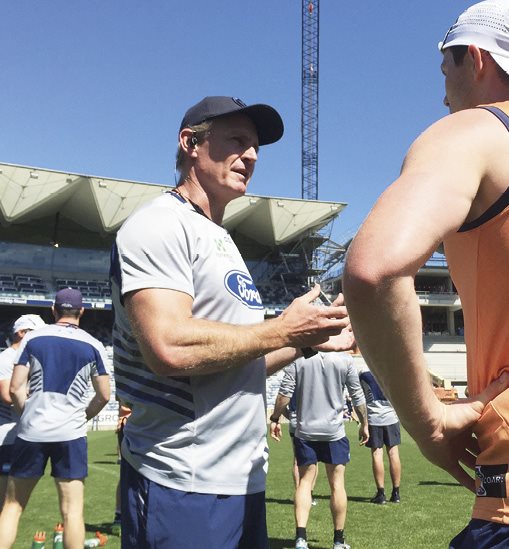 Simon has spent 20 years providing services across four clubs of the Australian Football League – Hawthorn, Collingwood, Fremantle and Geelong. He has also worked with Olympic and professional athletes across many sports. Over this time, his roles have included club psychologist, senior development coach, assistant coach and now, the Director of Coaching at the Geelong Cats.
Simon has spent 20 years providing services across four clubs of the Australian Football League – Hawthorn, Collingwood, Fremantle and Geelong. He has also worked with Olympic and professional athletes across many sports. Over this time, his roles have included club psychologist, senior development coach, assistant coach and now, the Director of Coaching at the Geelong Cats.
Simon has applied his psychological, strategic and tactical knowledge across the key football functions of coaching, leadership, development and recruitment. Over this time he has collaborated with, and led, large multidisciplinary teams to achieve immediate and longer-term organisational goals. His strong background in psychology, cultural development and leadership has been instrumental in driving values-based environments to live and breathe what they stand for.
What is the main characteristic that you believe all leaders should possess and why?
As a leader, your personal values are your guiding principles. Leaders need to be true to who they are and align their vision with that of the organisation in which they work. Personally, I have always valued the characteristics of authenticity and growth. Valuing authenticity has allowed me to strive for genuine, productive and connected relationships in the pursuit of excellence. Valuing growth has allowed me to be creative and reflective, and to nurture a culture that fosters a growth mindset. Growth builds on investing in strengths and allows for a focus on learning and development. A growth mindset develops people to be resilient through pursuing the types of challenges that can lead to both learning and failure, and to thrive despite day-to-day challenges.
What other characteristics and attributes make a good leader?
My five-year old daughter has pointed out on occasion, “I’m picking my clothes dad, you’re not the boss of me.” We all have an in-built need for some freedom, and so an important attribute of an effective leader is the ability to foster autonomy. The desire to self-direct within one’s role is critical. Experience has shown me that athletes, coaches and support staff need to feel empowered by the program and to actively contribute to it. In this way, supportive leadership behaviours encourage autonomy, and autonomy promotes engagement over pure compliance.
What do you see as some of the key opportunities and decisions that have helped you in your leadership roles?
I am fortunate that I have had many opportunities to develop, manage and lead professional training programs and introduce systems with a focus on delivering high performance. The most valuable opportunity has been to reflect and learn from the mistakes made along the way. I now have real clarity about what works and how to challenge unhelpful core beliefs in individuals and organisations. In an environment that can be intense with many external pressures, people need predictability and calmness to perform. A leader's role is providing that clear vision and strategic direction while also creating a way for people to contribute to making something extraordinary happen.
One of my most important undertakings as a leader has been facilitating the evolution of a team’s vision and values. This is an inherently creative, aspirational and reflective process. My personal style is to consult widely and invest heavily in communicating the vision in a compelling way. This enables acceptance and adoption at all levels of the organisation. I bring a methodical approach to operationalising the vision through short, medium and long-term strategies that are consistently reinforced.
What are some of the challenges that you have had to overcome in leadership positions?
Although I have often espoused work-life balance as a psychologist, at times it has proven a challenge for me to apply consistently. I now recognise through quality mentoring that leaders need to see themselves as performers in their own right and need to challenge themselves to be in good physical and mental shape. I have learned to consciously make time to openly reflect on my personal values and how I am realising these professionally and personally.
Did your psychology background help you in taking on leadership roles and if yes, how?
Leadership and coaching is a social activity based on relationships and meaningful conversations. My psychological knowledge and practice informs how I understand human behaviour, and therefore how I respond to it. It has allowed me to be present and connected in-the-moment as a way to build vitality in work relationships and for shared performance goals. Most critically, my psychological background has driven my consideration and application of ethical decision-making processes in all my leadership roles.